February 27, 2019
I feel like I’m living in a Fellini movie. Consumption of food and alcohol has reached amazing proportions. Take Monday for example.
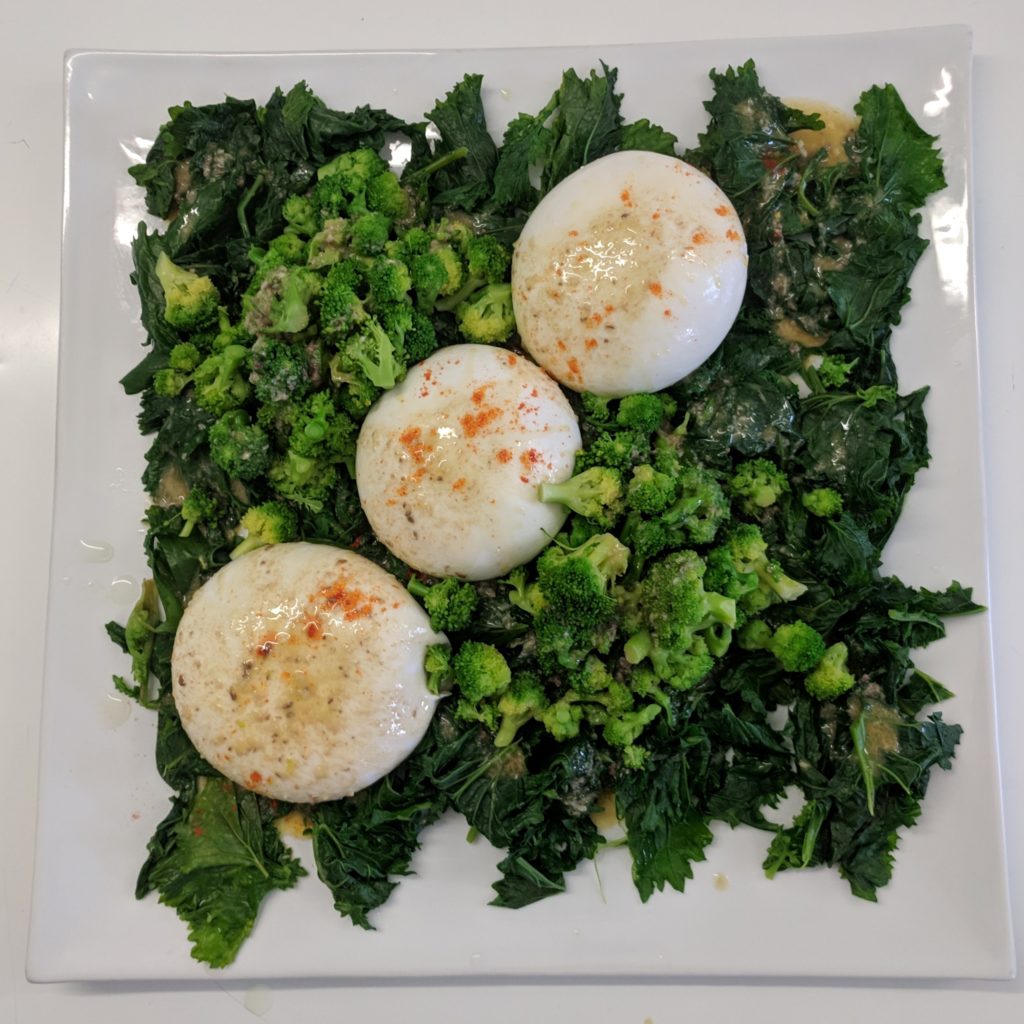
Monday, February 25, 2019 was day five of our sommelier training. Sommelier days started in the kitchen with food preparation and consumption and ended with about three to four hours of wine tasting (followed by dinner…and more wine!).
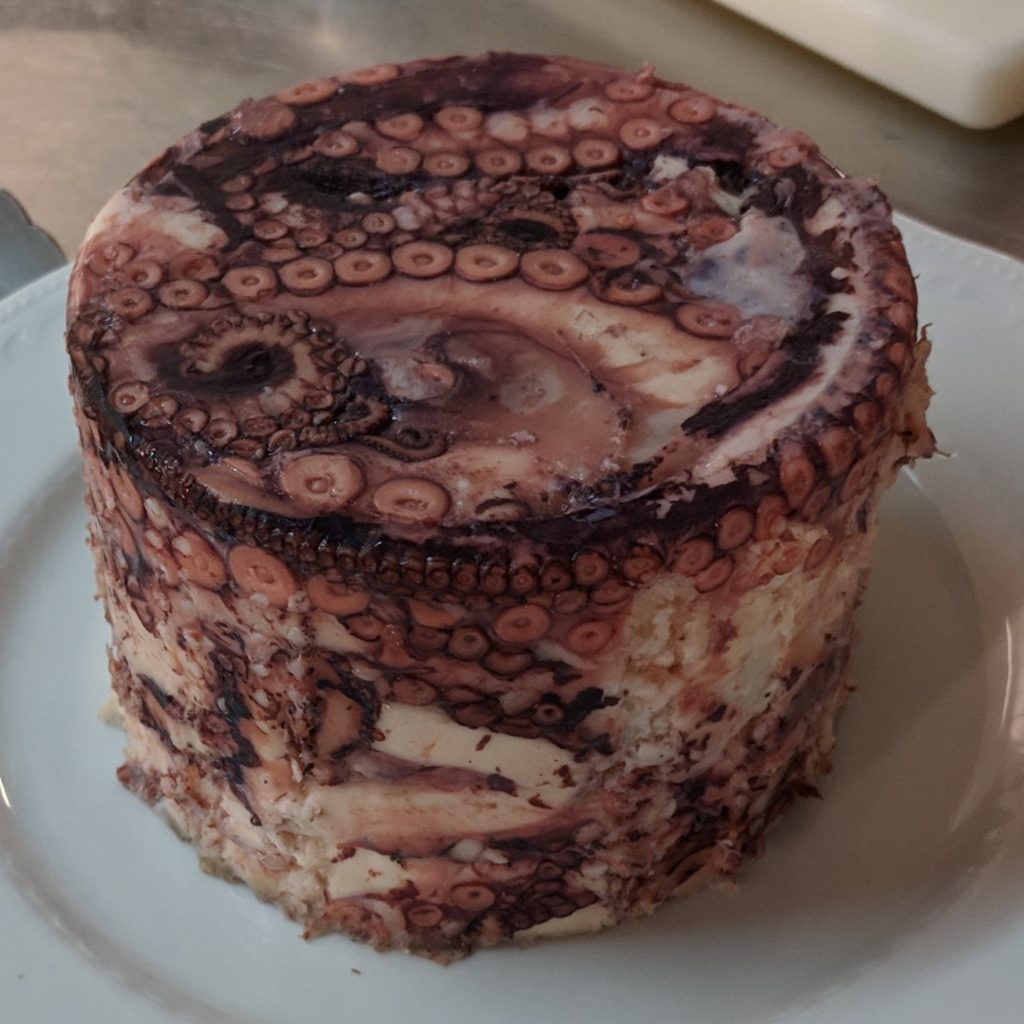
The previous night, Sunday, we went out for pizza, drinks and karaoke so Monday started at the unusually late hour of 10:00 AM (except for those of us who had signed up for baking duty).
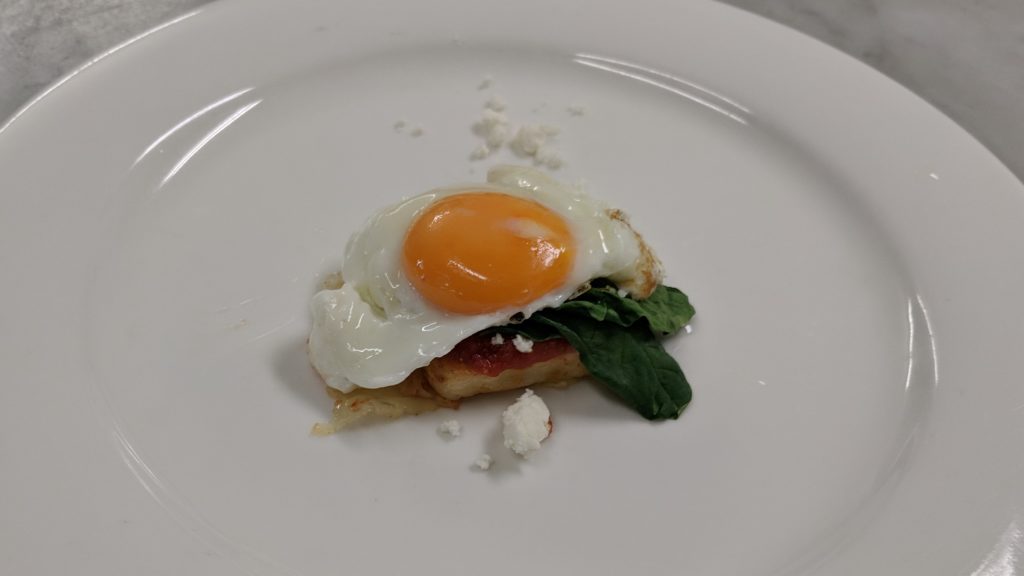
In the kitchen at 10 AM Chef John immediately prepared a plate of Tortino di Semolino (similar to semolina gnocchi but cut into larger pieces) accompanied by a fried egg, steamed spinach, tomato sauce and feta cheese. Next we had a bowl of tripe stewed in tomato sauce, topped with battered and fried onion rings and seared foie gras and accompanied by crostata. Following that was Bavette (similar to linguine) with a sauce of baby octopus and tomato sauce and plated with octopus carpaccio.
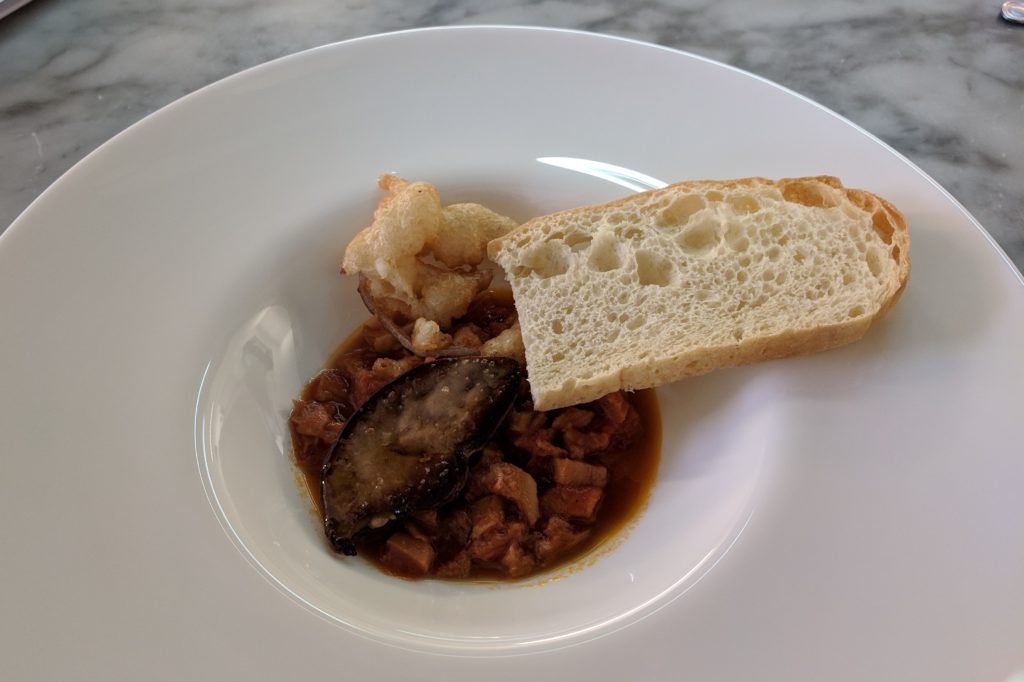
At this point it was now noon. Only two hours had passed and we had consumed a day’s worth of food.
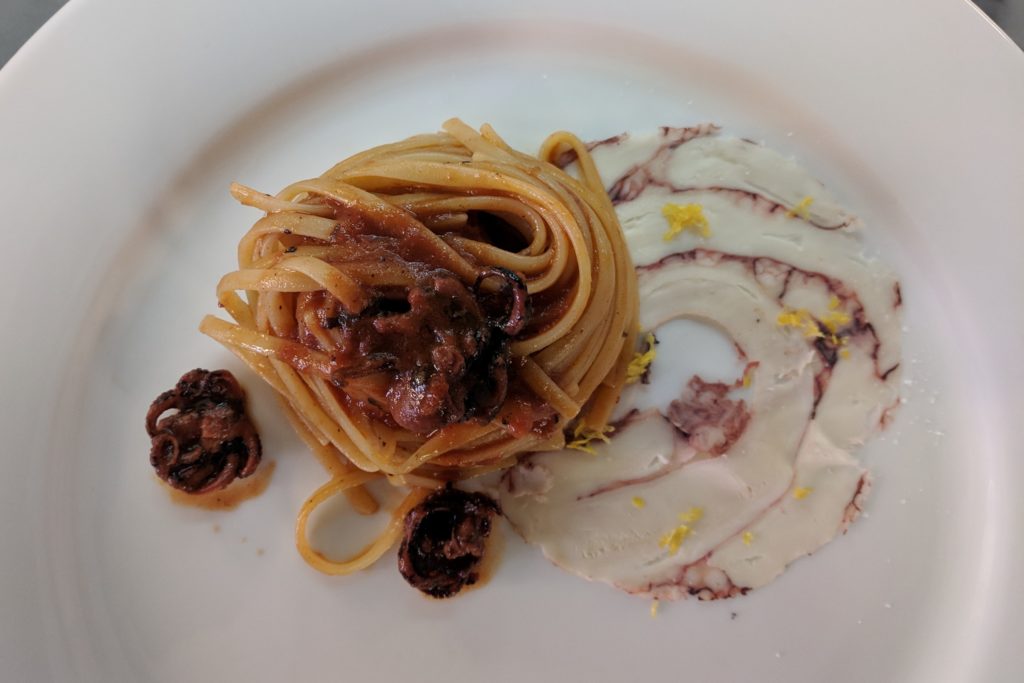
Shortly after noon we were served maltagliati pasta with braised oxtail, fava beans, rosemary oil and Parmesan cheese. This was followed by a “milkshake” made of housemade fior di latte gelato, heavy cream and bourbon vanilla paste! Now it was shortly after 12:30.
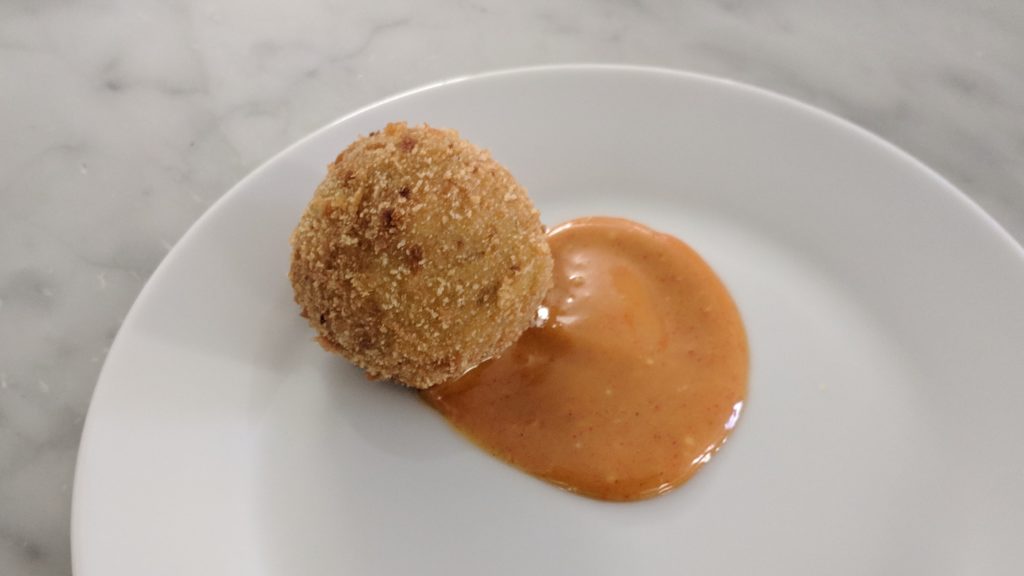
We were turned over to Chef Juan for a lecture on food costing during the height of our postprandial somnolence. At 2:15 we went into our fifth day of wine tasting with Chef Mark.
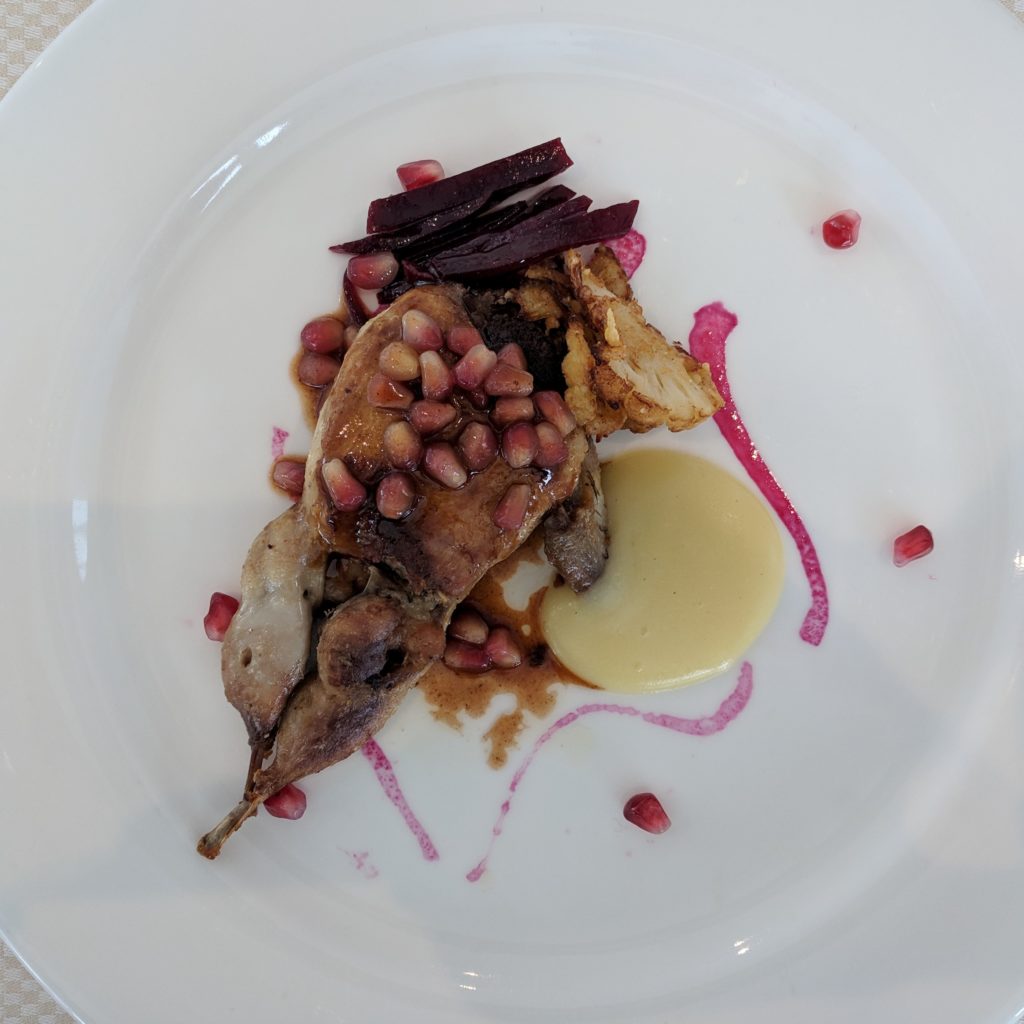
We tasted only four wines, a very short list compared to the other days, as Chef Mark was making a five-course wine-pairing dinner for us that evening. The afternoon wines were paired with a dish of boned quail stuffed with truffle-and-cream laced bread stuffing, seared in a mixture of olive oil and lardo di colonnata, served with a potato and celery root puree, matchstick beets, seared cauliflower, pomegranate syrup and pomegranate. The idea was to evaluate how each of the wines paired with this very complex dish. (Generally not well, is the answer.)
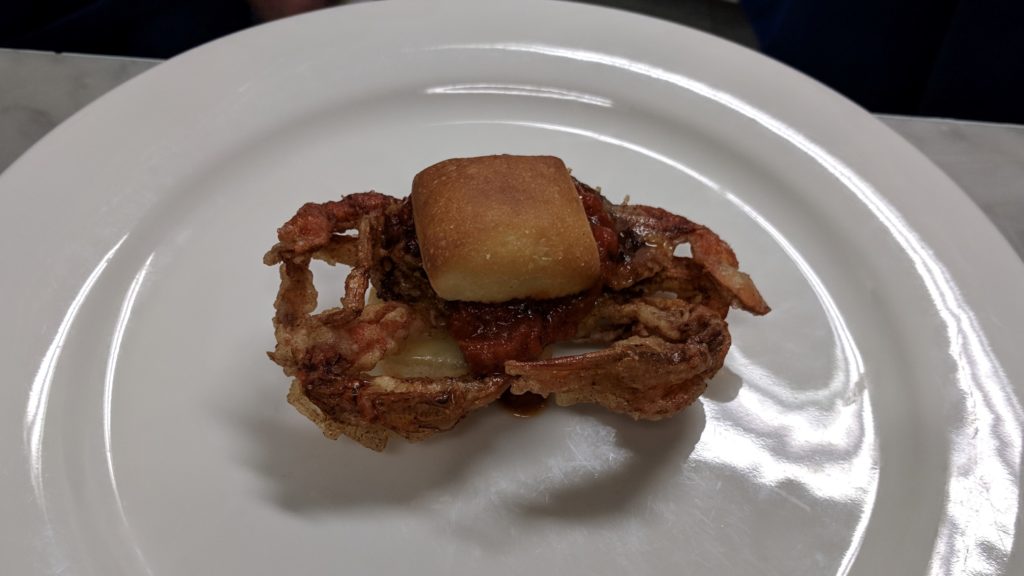
Blessedly, we had a few hours off so that Chef Mark could cook. Around 4:30 I headed to my suite. At 5:00, I decided to take a quick nap, thinking I really wouldn’t sleep. When my alarm went off at 7:00 I couldn’t figure out why the alarm was sounding before the sun had risen. It took me a few moments to realize it was evening and I had to be at dinner at 7:30.
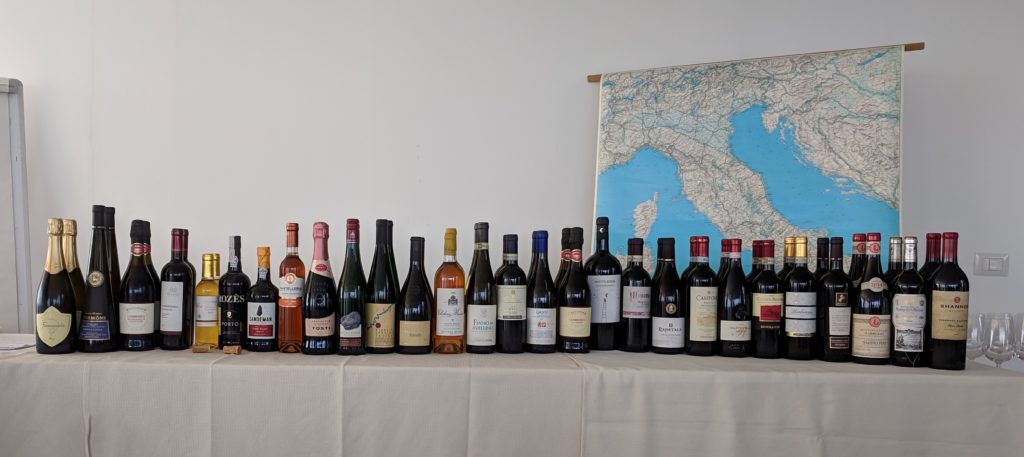
Dinner was a five-course meal that was NOT Italian but that was designed to explore wine pairings. The first course was an Indonesian-inspired shrimp curry in coconut milk. Next was a vegetarian plate of broccoli and cauliflower, each prepared three ways including pureed, pickled, and cooked. Next was Mexican-inspired albondigas soup in a very flavorful broth made from house-cured pancetta and multiple types of dried chile. The main course was chicken thighs braised in beer. The braising liquid was used as the base for a peanut mole. The dish was served with a cornbread that was very much like a corn pudding. Dessert was a tris of gorgonzola: gorgonzola cheesecake sprinkled with chopped pistachios, shortbread with a gorgonzola cream sauce and a sweetened pistachio puree, and a ball of gorgonzola with orange blossom honey. Each dish was accompanied by a different wine, except for the chicken which was accompanied by the same beer I which it was cooked.
Doesn’t this sound like a Fellini movie???
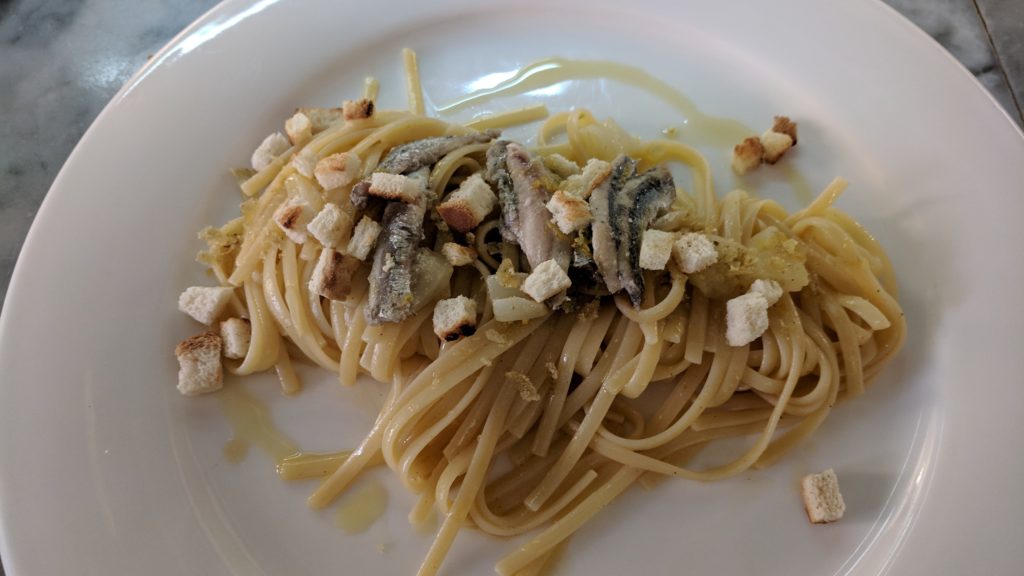
This is pretty much how the previous four days had gone, as well. The first day of this week-long session was Thursday the 21st. It was the first day after our five-day break. In the morning we went to the market in Catanzaro Lido. Frank was still with me. We were looking at the stall of a vendor selling ceramic and terra cotta wares.
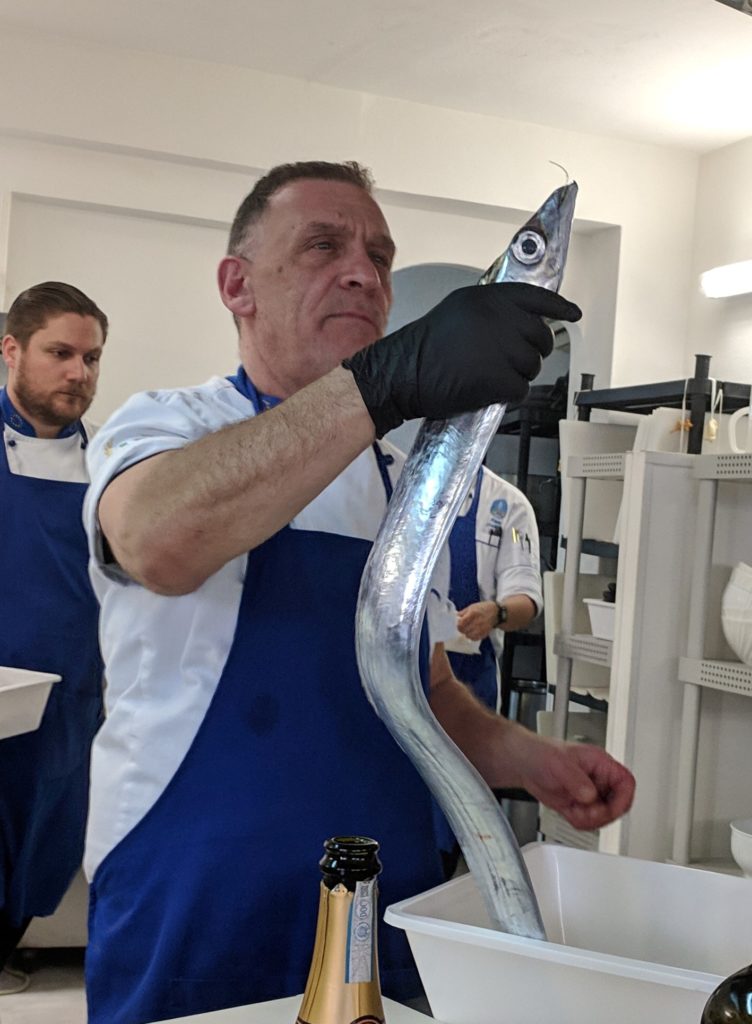
I was quoted a price of €10 for a ceramic spoon rest. I thought it was expensive compared to other similar items that actually had price tags. I was about to leave when an Italian woman came up and began a very animated conversation with us. I told her, in my limited Italian, that I was a student at the culinary institute. The conversation continued for a while with me struggling to understand and respond. Then she pointed out a two-part terra cotta contraption meant to hold a candle to heat ‘nduja in a small terra cotta bowl. The warm ‘nduja was to be spread on bruschetta. I confirmed that I loved ‘nduja. She told the vendor to give us a good price so I took the plunge and said I’d take the spoon rest and ‘nduja warmer, expecting to be quoted something like €25. Instead, the price for both was €13!
When Frank and I wrapped up shopping, we sat at a nearby bar (a “bar” is a coffee bar in Italy) having espresso. Teresa, our new friend from the market, came by and said she was buying us another round of coffee. She did so and briefly sat with us. She is a commanding presence. Despite being very lively, she spoke Italian (to us) clearly and slowly so that I understood almost everything, learning about her children who are living in Russia, for example.
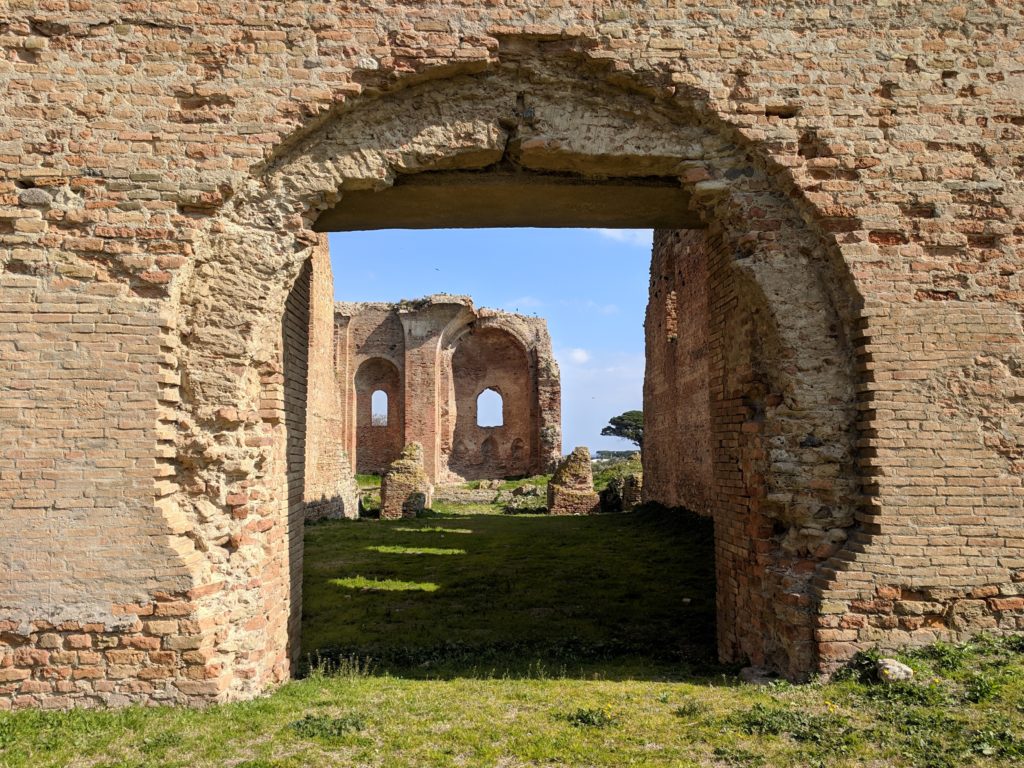
Following the market, we went to Scolacium Archaeological Park. The area of the park was originally inhabited by the Greeks, followed by the Romans, followed by… you get it, the usual story of Italy! It was discovered when the owner was working on his olive grove.
Back at school, lunch was a multi-course affair that included rabbit, which Frank loved. (Don’t tell his mother! He’s convinced her that he doesn’t like rabbit which, of course, isn’t true. He’s also convinced her he doesn’t like fish and soup which also isn’t true.)
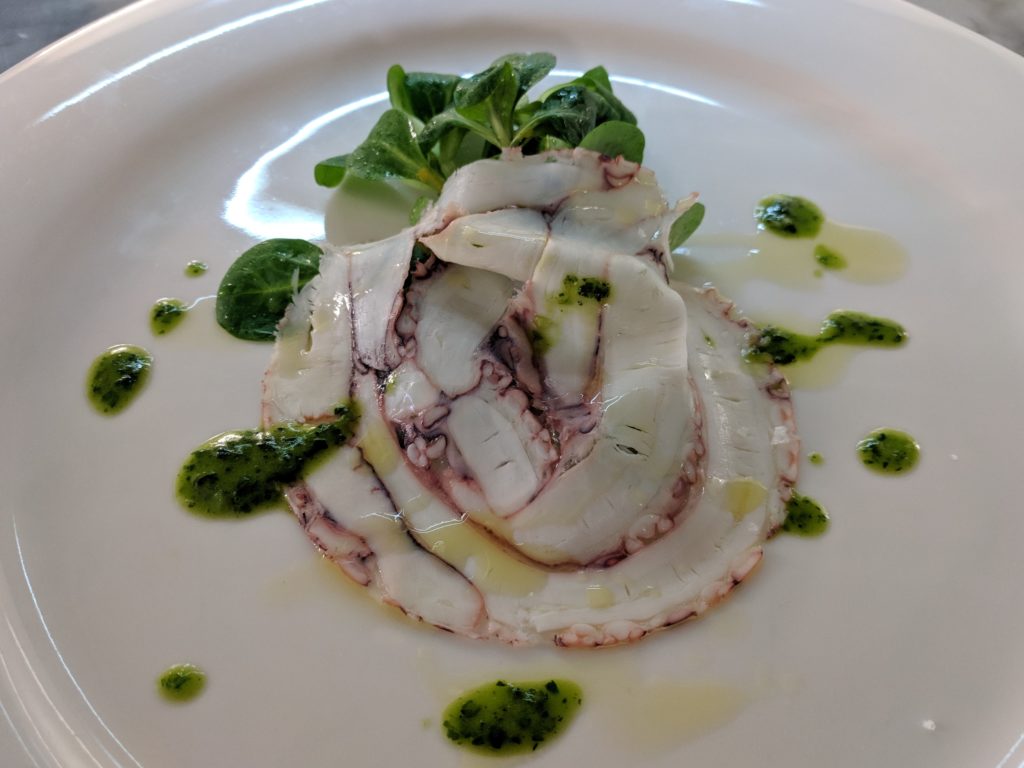
That afternoon was our first session with Chef Mark McDonald, who is also a sommelier. We were instructed in a method to analyze wine, and tasted five different wines. I’m sad to say I didn’t make any notes about dinner, nor did I take any pictures so it’s lost. I know for sure that I didn’t have any wine!
The next morning, we started with hands-on in the kitchen. Afterwards, Chef John used many of the ingredients we had prepped to make dishes for us to eat. I took the lead on making spinach pici. Pici are thin, rolled pasta similar in length to spaghetti but a little thicker, and hand rolled. As I write this, the pici have not shown up on any plate served to us. Sometimes the Chefs eat the food, sometimes it has to be disposed of—but rarely—sometimes it appears weeks later!
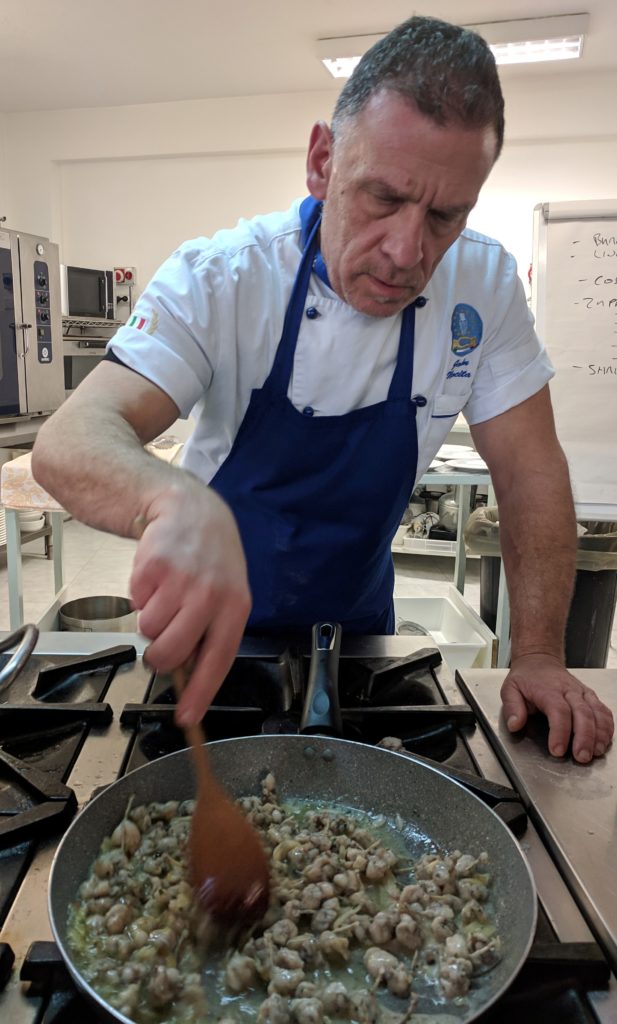
First to be prepared and served was Broccoli Rabe and (huge balls of) Burrata and dressed with extra-virgin olive oil (we go through gallons per week), lemon juice, anchovies and garlic all blitzed in a food processor. Following that we had a riff on a Sicilian dish, Pasta alla Sarde, but made with anchovies which Chef John prefers to sardines. We tasted house-cured Bottarga and then moved on to an exceedingly complex Zuppa di Pesce (fish soup).
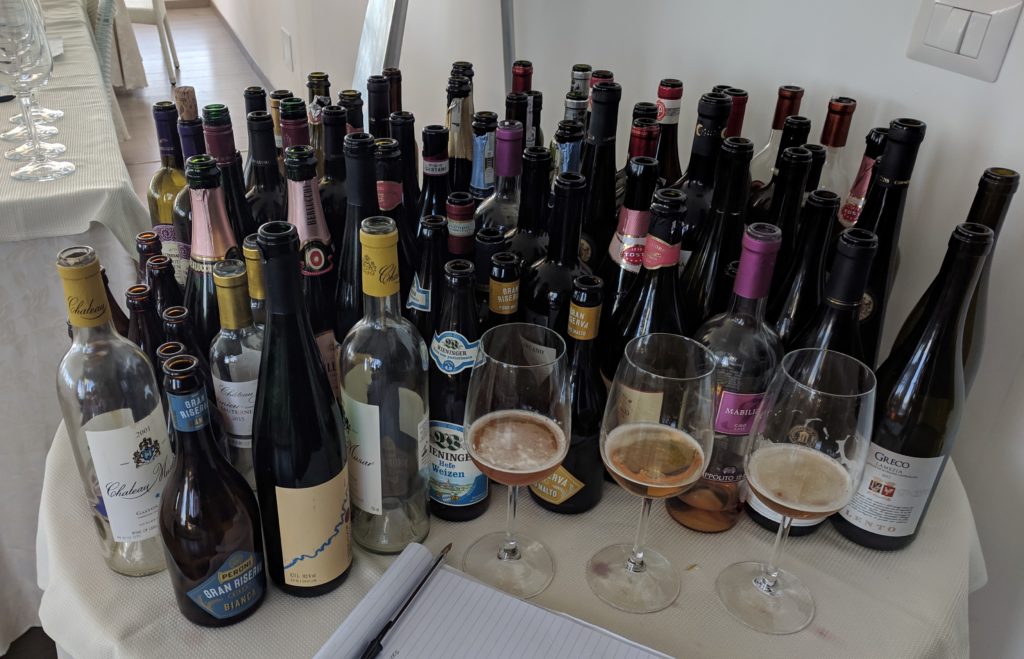
To make the fish soup, Chef John first made a light Fish Stock from bones and heads with some veggies and tomato puree. He cooked mussels and added the cooking liquid to the broth which was ultimately frapped and strained before using. He baked whole langostino after coating the tails in seasoned breadcrumbs. He sautéed shrimp in shrimp butter which was made by combining equal parts butter and fresh, whole shrimp and cooking and mashing till the shrimp started to crackle and brown after which the butter was strained and the shrimp discarded. He cooked branzino (sea bass) filets in butter. Then, and only then, was the soup assembled. Into the bowls went mussels, branzino, shrimp, and fish broth. On top went the langostino. A piece of focaccia was artistically inserted along the side.
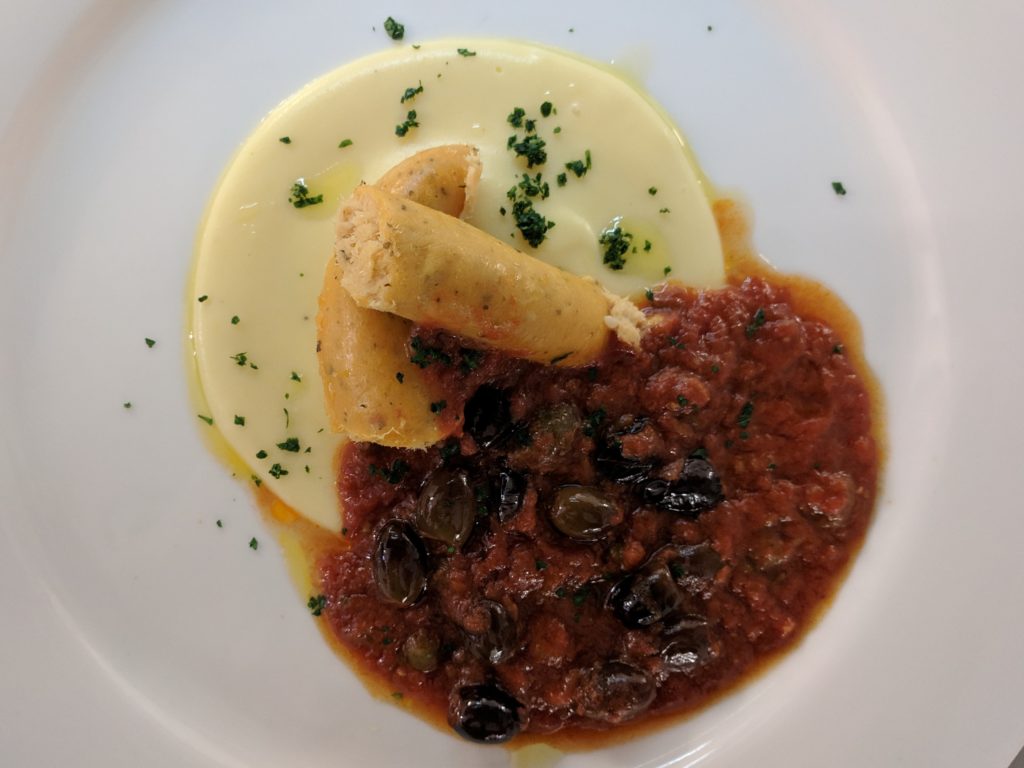
The soup was followed by lolipopped frogs’ legs (that we had previously prepped and which had been frozen for a couple of weeks) cooked in brown butter then doused with prosecco. After the frogs’ legs he made Sarde in Saor, a Venetian dish of floured and deep-fried sardines layered with an onion mixture. The onion mixture is made by cooking lots of thinly sliced onion in lots and lots of olive oil. When soft, vinegar and sugar and raisins are added. Mercifully, this dish needed to marinate so it didn’t get served until dinner.
Chef also demonstrated how to make conserved tuna and his version of eggplant parmigiana. The parmigiana also appeared at dinner. The tuna is in jars waiting for another day!
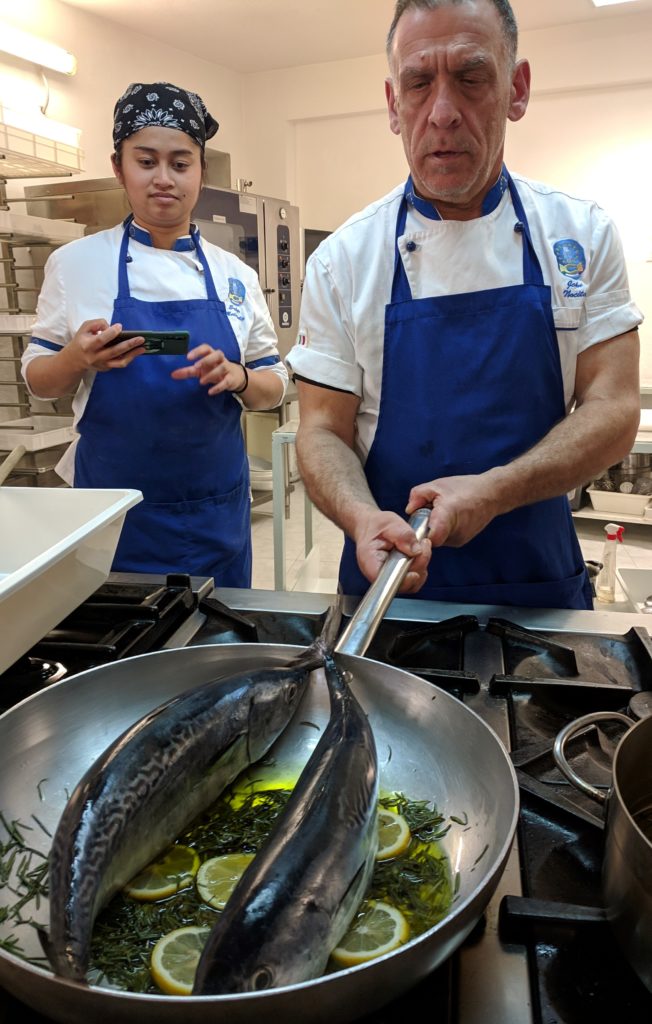
At this point, Chef Mark got us for an afternoon of wine tasting. We tasted seven wines before I took a pre-dinner nap!
The next day, February 23rd, started with making two breads: Honey Bread and Butter Bread. Both would end up on plates over the next two days, most notably, the butter bread was used to make soft-shell crab sandwiches!
Chef then made, and we ate, fish tartare with crispy fish skin. Following this was a beautiful octopus carpaccio (the extra of which would be served on the 25th along with pasta and a sauce of baby octopus). Chef then made two different olio cotura dishes, one salmon and one spatula. Spatula is a long fish with nasty sharp teeth that looks like a barracuda. Olio cotura basically involves poaching something in oil. We ate both of these later in the day served with a caper foam that Chef Juan whipped up.
The day in the kitchen ended with Vitello Tonnato, traditionally thinly sliced cold poached veal served with a tuna fish mayonnaise and capers. Rather than poach the veal, Chef cooked it sous vide. The small amount of liquid from the sous vide was incorporated into the mayonnaise along with house-cured tuna. After the Vitello Tonnato we had Tomato Soup made from house-canned tomato puree followed by Milanese, thinly sliced veal or beef, breaded and fried in CLARIFIED BUTTER! We went to the dining room for lunch (yes, lunch) of pasta with a sauce of pureed house cured and smoked salmon and cream.
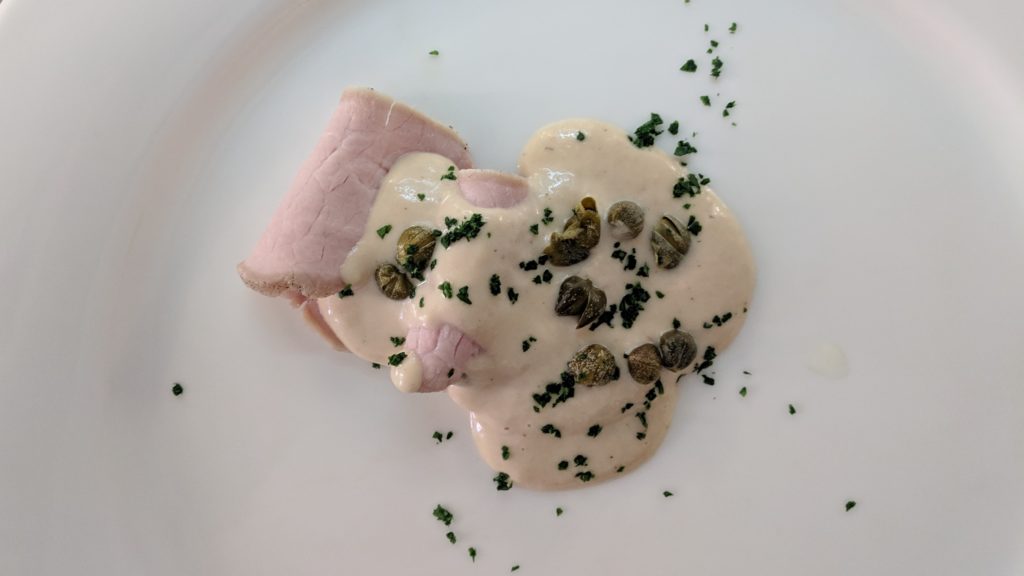
Chef Mark then started an afternoon of wine tasting. I think we had six wines based on my notes.
On the 24th, Chef demonstrated the cooking of the oxtail that was served on the 25th with pasta and fava beans. He also started the baby octopus sauce for the next day. With those demos out of the way, he cooked something that was served to us: Chick Peas with Infused Olive Oil, the kind of simple peasant food that I love!
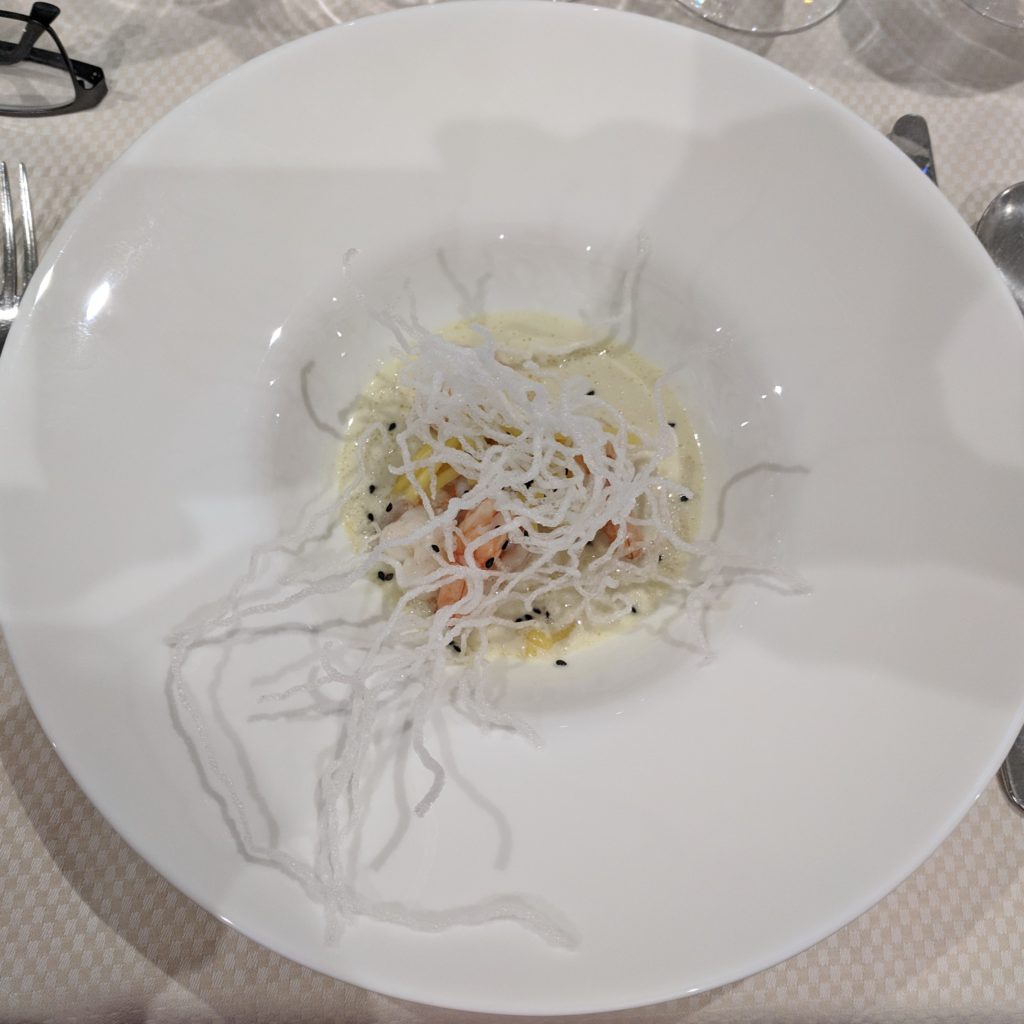
We then had Tuna Croquettes served with the Shrimp Demi followed by sausages made of Baccala (salted cod) [for which Chef Juan stood in the back of the kitchen for over an hour stuffing tiny, tiny casings using a funnel and his fingers] served with polenta and Salsa Livornese! We made two kinds of Arancini but after I deep-fried the first batch, the remainder were put away for another day (sometimes restraint shows through but not often!).
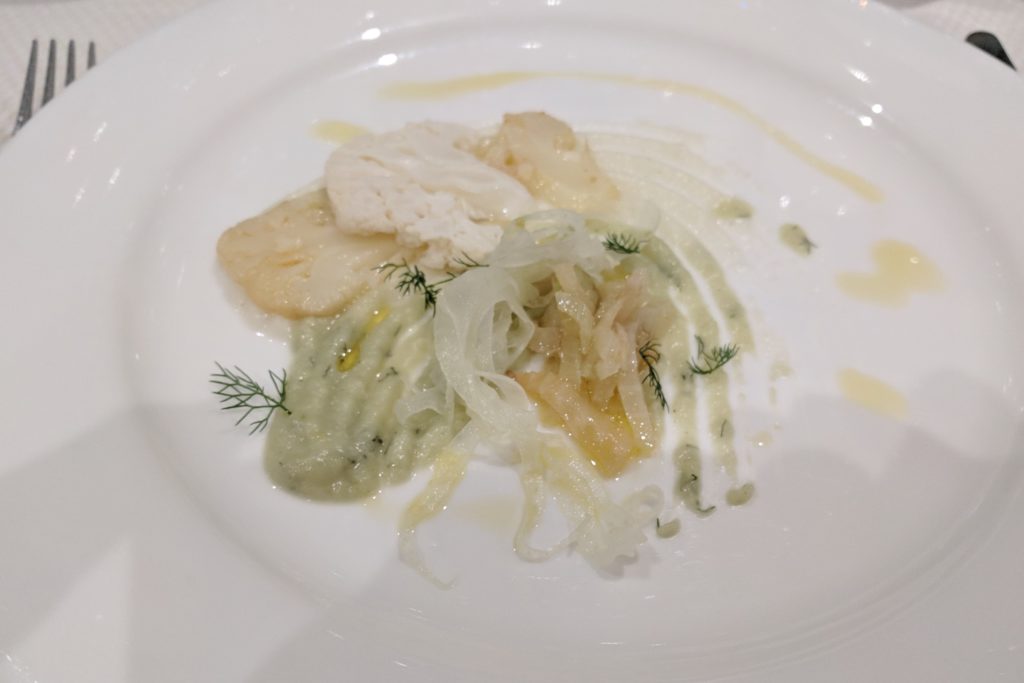
Chef started the tripe that was served the next day as well as his take on Buffalo Wings, involving turkey wings, pepperoncino picante and 20 hours of sous vide before the cooking liquid got turned into a sauce using ‘nduja and butter! These didn’t make it to the table until the afternoon of the 26th when they were served with a beer tasting headed up by Chef Mark.
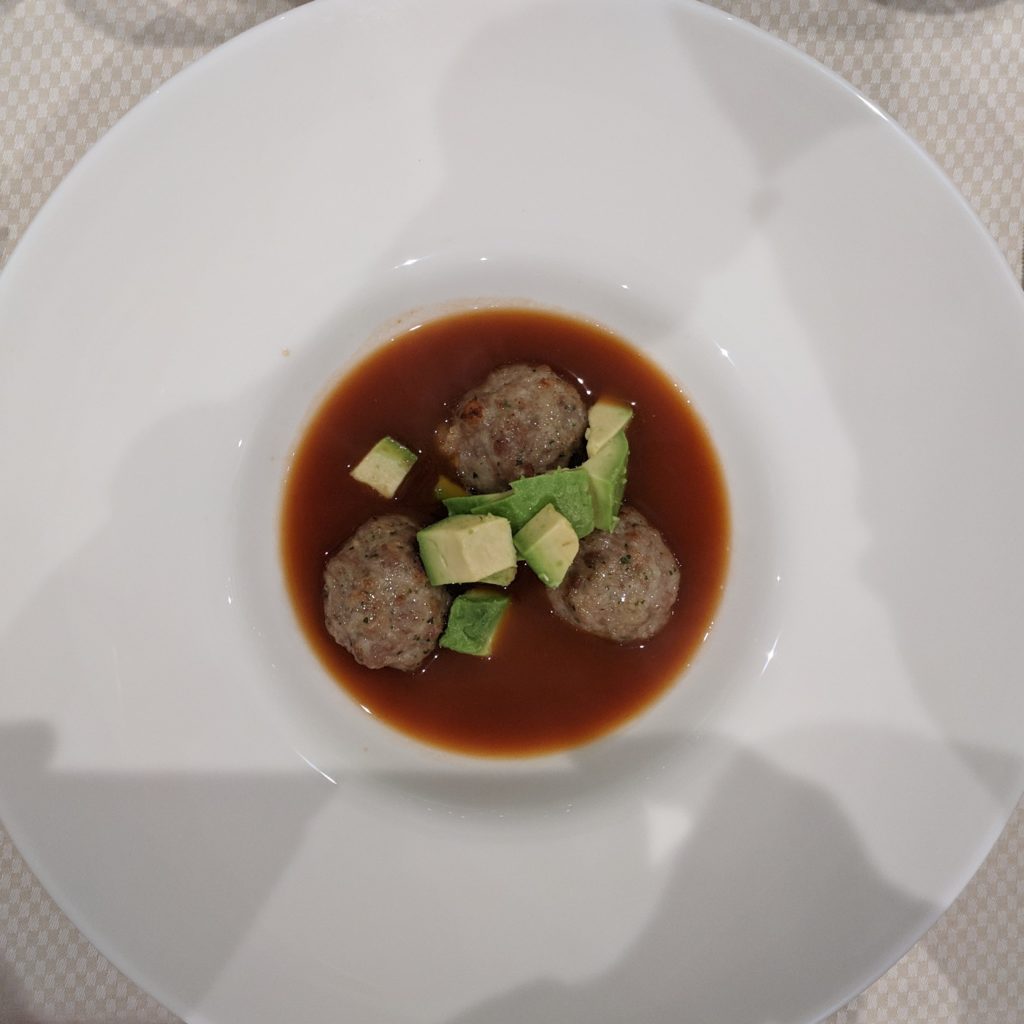
Chef demonstrated the preparation of the quail that would end up on a tasting plate the next day (truffle stuffing, seared in olive oil and lardo di colonnata, etc…). The day in the kitchen ended with battered and fried soft-shell crabs served on butter bread with tomato sauce and cheese!
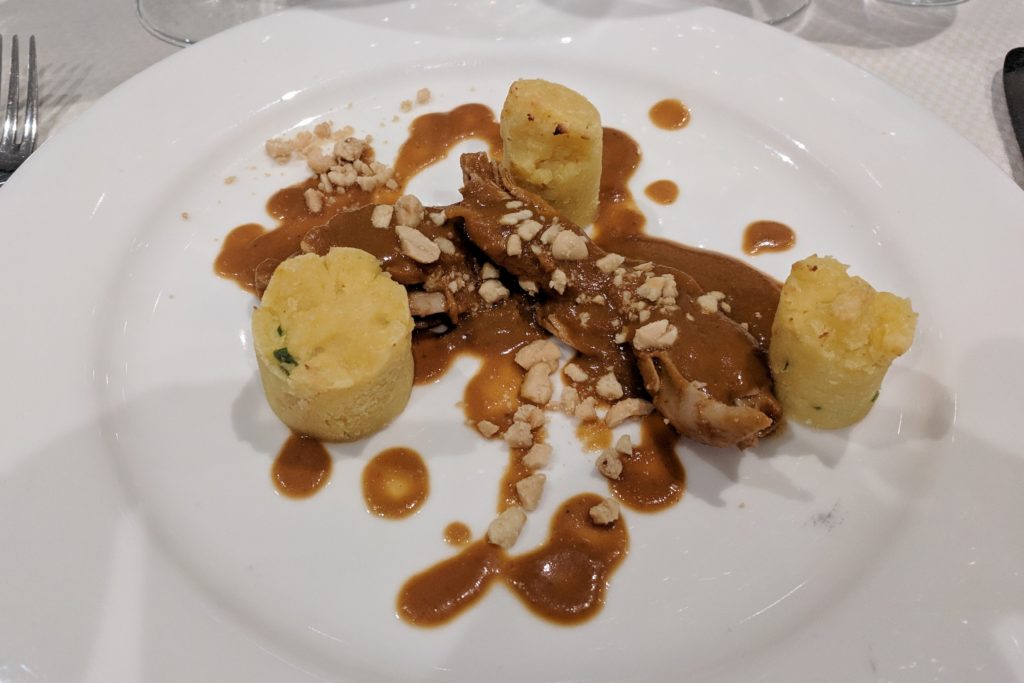
Chef Mark’s wine tasting involved five wines. We had a few hours to recover before going out for pizza, karaoke and alcohol. The school paid for the first round of drinks for everyone. A few of us then ordered another drink not knowing that Chef Mark would buy bottles of liquor for the table! I was among those with the smallest alcohol consumption that evening (three Jack Daniels’, two Obans, two Rums, and about 3 or 4 Gins—one of which involved a bottle being poured into my mouth [well, mostly onto my face] while on the dance floor).
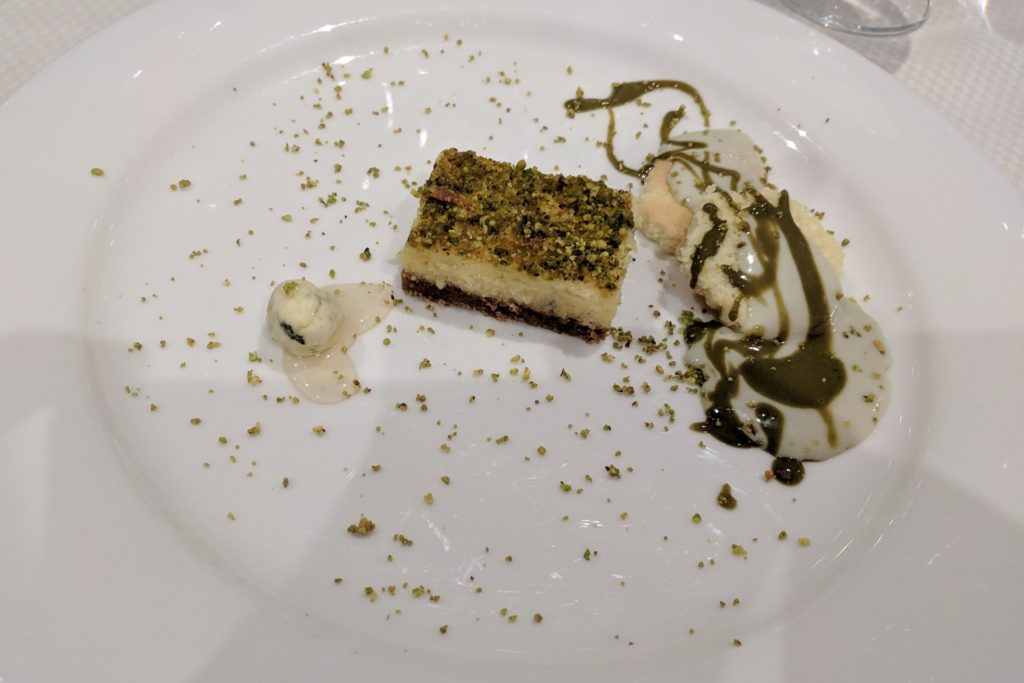
You now understand why the next day started at 10 AM instead of 9 AM

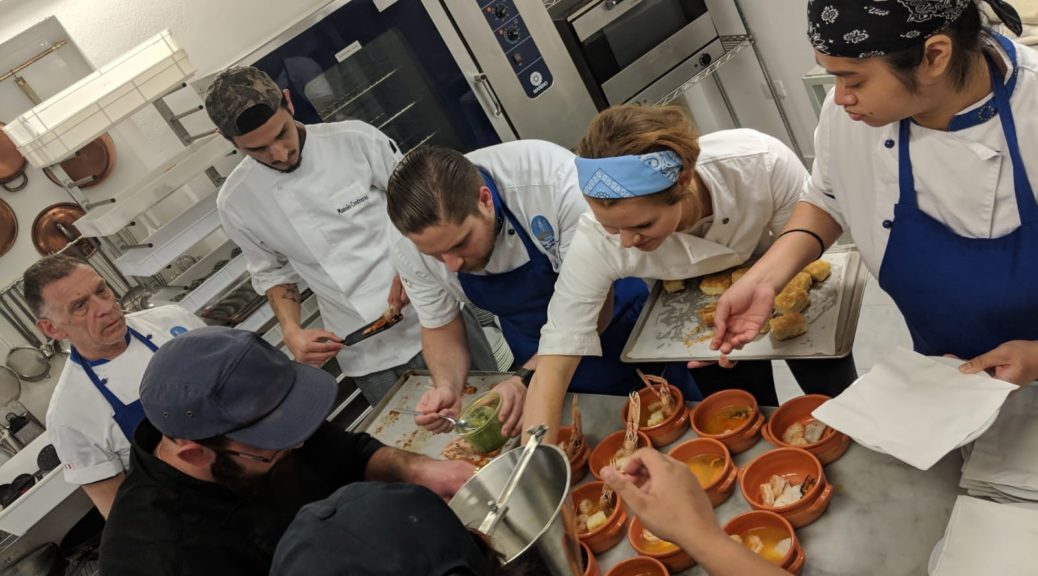
Let me know if you get this! The octopus before it got cut is quite a sight. It looks better slightest.
Hi Gay, yep, it came through!!! The octopus was actually quite good. I’ve only ever had raw octopus carpaccio. The cooked version is quite nice.
Did you get this?
Yep!
OK, here is my third comment on this blog; I do not know if you are getting your money’s worth in terms of the instruction, but I think your trip has already paid for itself in food and liquor! Wish you had all my previous comments, but I guess they did get spammed out. It is hard even to use the word spam in light of this culinary extravaganza! Heard the spoon rest story from Frank at dinner. Fun stuff. Love from Julie too, Gay
I think you’re right about the trip paying for itself in food! I’m learning a lot, too! I’m so sorry your previous comments were lost. It sounds like you put your heart and soul into them.
Good grief! How much do you weigh now Gary? hahhaha. Unfortunately, for me there is too much ‘strange’ food being prepared for my liking. I truly like peasant food and I’m sure it takes far less time and fuss to make! haha. I’m so glad you and Frank had a wonderful time together and that he got to experience some of the culinary delights! Happy cooking 🙂
Hi John, we actually do a lot of peasant food though some of that would be “strange” by your criteria. I’ve gained about 5 or 6 pounds, I reckon. There isn’t a scale handy and I haven’t sought one out. I can still button and zip up my slacks, though! Gelato week starts on Sunday so all bets are off on weight gain.
Oh my! I get full just reading about all the food! I don’t know how you consume all that food and liquor in one day. And, seemly it is day after day. Do you do lots of the prep and platting once the Chef demonstrates what the dish is going be??
Many of us talk about how we keep up the consumption. As strange as it may sound, this is really just the culinary version of working long hours as a medical resident. Tasting an array of foods–as many as possible–is critical to understanding the flavors of a cuisine. We all pitch in on plating. The headline picture for this blog is an example of a bunch of us plating the Fish Soup.